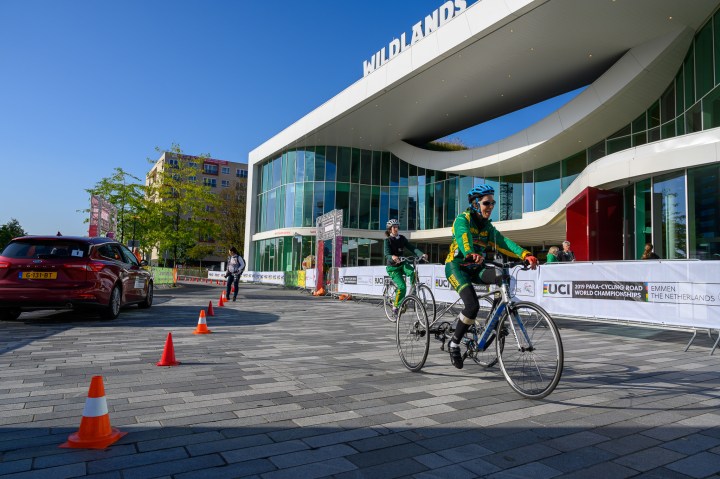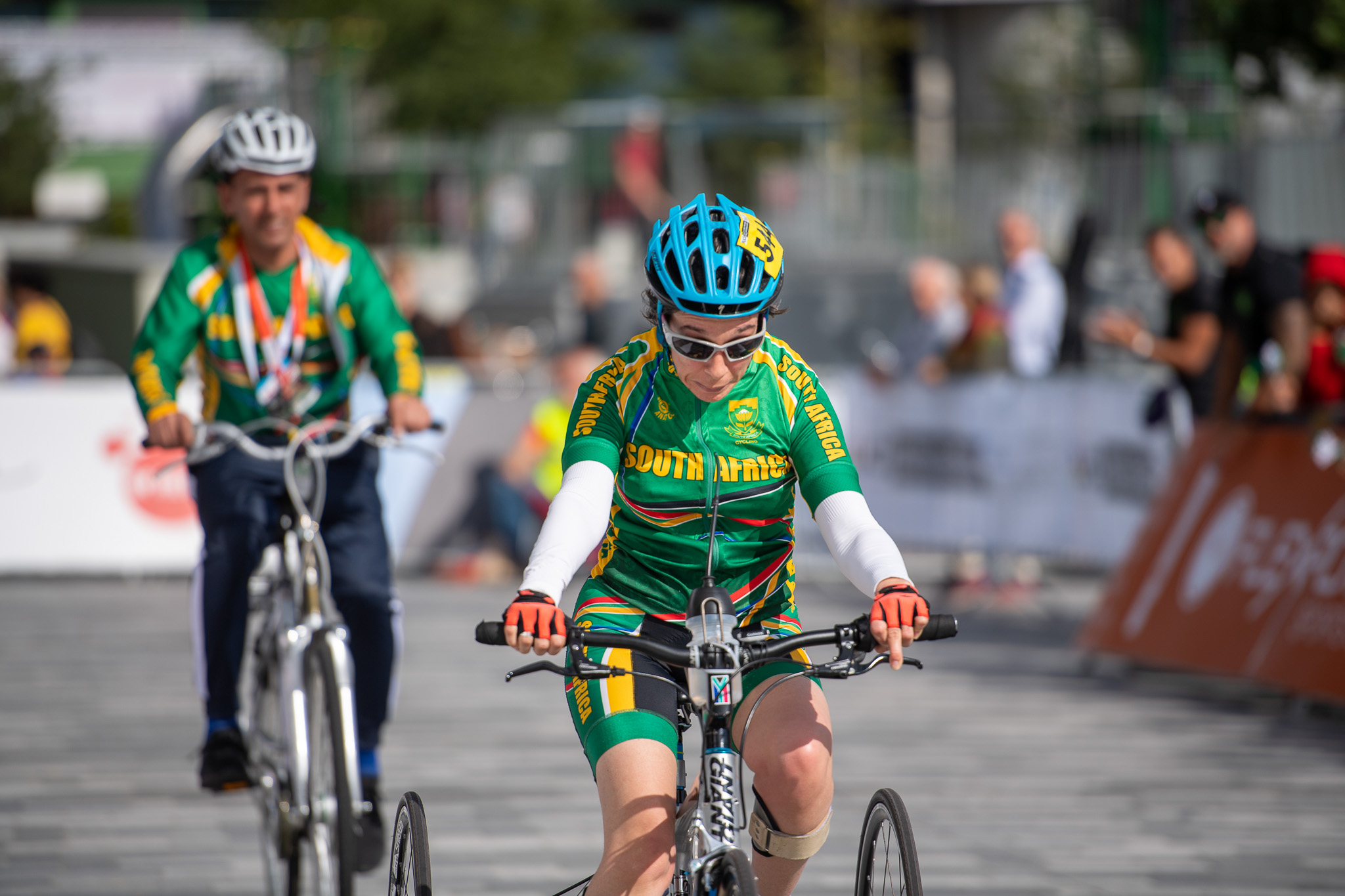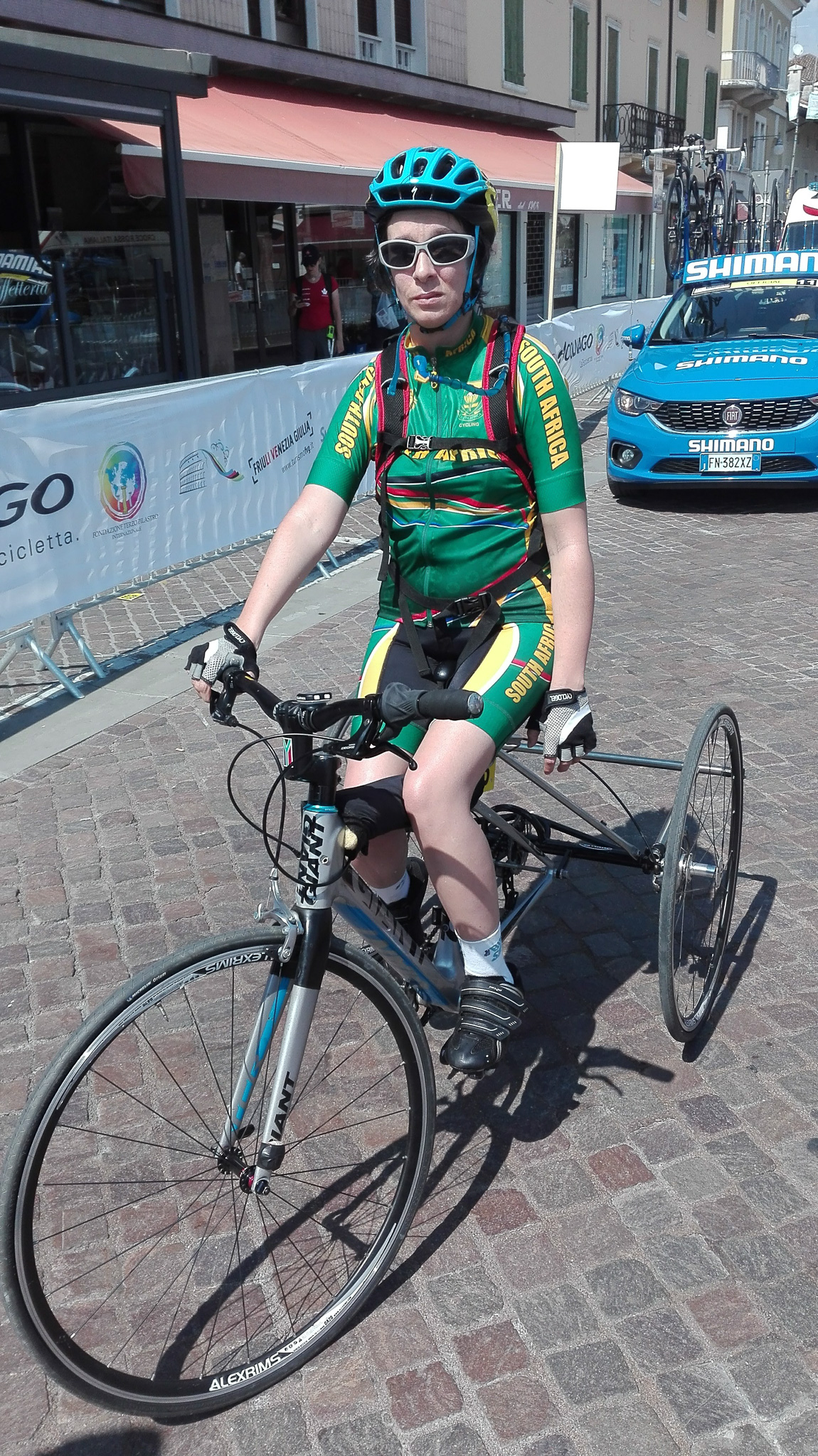Maverick Life
Toni Mould: Living with cerebral palsy, finding freedom through para-cycling

Toni Mould is a 37-year-old para-cyclist who has carried the South African flag for more than seven years. She shares her experience as a national athlete with cerebral palsy and how sport has changed her life.
Toni Mould discovered paracycling ‘quite by accident’, she says. As a child, she loved sport and always wanted to be involved in some sort of physical activity, but at the time, there were few opportunities in her hometown of Plettenberg Bay, especially for someone with her disability.
Mould was born with Cerebral palsy (CP), which according to the Centre for Disease Control and Prevention is ‘a group of disorders that affect a person’s ability to move and maintain balance and posture… Most CP is related to brain damage that happened before or during birth’. It can affect different people in different ways and symptoms can include neurological problems and difficulty with mobility, muscle coordination and speech.
‘It affects basically all my muscles, so anything to do with muscle coordination or balance, movement, [as well as] my speech. It’s quite a wide-ranging disability,’ Mould explains.
‘Some [people] are more severely affected, some are less. I would say I am just over the halfway mark between severe and not severe.’
From the age of 12, Mould attended a mainstream ‘able-bodied’ school, but was never able to enjoy sport the way she would have liked.
‘Government regulations said I had to do school sports, you know, the weekly swimming and athletics. That frustrated me more than anything else – trying to do a gala or swimming with able-bodied children when you’re disabled is kind of … more off-putting.
‘I loved sport, I wanted to do sport as a young kid, but doing the wrong sport was more off-putting than encouraging,’ she says.
Becoming an athlete
It was at university, where she studied for her degree in Social Work, that she discovered ballroom and Latin dancing. This was her first real opportunity to participate as a person with a disability, but there was little opportunity to compete internationally.

Toni Mould at the World Championships in Emmen, Netherlands. Image courtesy of Toni Mould
‘I competed at Western Province level and I enjoyed it. It was awesome at the time, but I had no future in it as a sport, because most of the international dancers are wheelchair dancers and I wasn’t in a wheelchair, so there was nowhere to go beyond provincial. I danced on my own two feet, and there’s no category internationally for dancers like me,’ Mould explains.
After university, she was introduced to the world of para-cycling, which has been an event since the Beijing Paralympics in 2008; riders are allocated to various categories depending on their ability, according to the Union Cycliste Internationale (UCI). The competition comprises four groups of disabilities including for blind and visually impaired riders, people with cerebral palsy, locomotor disabilities and handcycling.
‘I think a lot of people perceive parasports as “soft sports”. It’s not. The hours, the effort, the injuries – it’s as hardcore as able-bodied sport,’ Mould says.
In 2012, Mould met up with a friend from university who had just returned from the London Paralympics.
‘She had been nagging me, almost, to join the cycling league for people with disabilities that she was part of,’ Mould recalls.
‘I had an old tricycle, but I had very few opportunities to cycle because I needed assistance – I couldn’t go out on my own or get on and off the tricycle. A friend of mine (Anet Wolmarans), had just bought a bicycle and she wanted someone to cycle with her and so we thought “let’s start together”.’
Wolmarans then rode behind Mould at a local league race to make sure she was racing on the road and has since become a constant in Mould’s cycling career.
‘As we developed, Anet started to come to competitions with me and she’s travelled the world with me,’ Mould adds.
‘Her role is basically to help me cope with everyday life on a tour. I use a lot of energy for everyday tasks, and Anet does those everyday tasks on a tour so that I have more energy for my cycling. (When) not on tour, she’s just a friend.’
Going international
Just six months into cycling, the local league she was a part of encouraged to start cycling competitively.
‘The organiser took notice of me and said I have the potential to go to a national and maybe an international level,’ Mould recalls.
However, the equipment she needed was expensive and she was not able to fund the sport by herself.

Toni Mould at the World Championships in Emmen, Netherlands. Image courtesy of Toni Mould
‘My tricycle was too old and too heavy to compete in. I took about 18 months to raise money for a proper tricycle – it was quite expensive, and I don’t have that kind of money.’
Through crowdfunding, Mould could then finance her new tricycle, and went on to compete at the South African National Time Trial and Road Race Championships in 2015.
‘I think I had been on the new trike two or three times before my first race, so I can’t say I actually raced my first race. It was more to stay on the trike and to finish the race, because [it was so] different to my first trike,’ she laughs.
Two months later, she was competing in her first international World Championships, and has qualified for and been a part of the South African national squad every year since.
‘It takes everything, mentally and physically, to race. Sometimes after a training session, I can’t walk on my legs because they feel like jelly – I have to sit down for a few minutes before I can go on with life.’
Before the Covid-19 pandemic, the athlete trained for around four to five hours a week, worked out at gym around twice a week and worked with a biokineticist to target and strengthen certain muscles. In October, she bought an indoor smart bike connected to Zwift (a programme that helps training virtually) that allows her to train without leaving the house.
‘As a person with a disability, I am more vulnerable should I get Covid-19, so Zwift is now the main form of training that I’m doing. I do go out on the road, but I can’t go out alone, so I have a couple who comes to take me cycling every second Sunday. That’s not much training for a competitive cyclist, but it’s what I have, and I always try to work with what I have and not worry about what I don’t have.’
Mould has gone on to compete around the world and has won trophies and medals at various competitions – such as a UCI World Cup in 2016 and a silver medal in 2017 at the World Championships – and was also named the Cape Winelands Sportswomen of the Year with a Disability in 2018. However, she says there is so much more to cycling than the accolades; para-cycling has given her independence that would otherwise be hard to find, she says.
‘A big thing for me is the freedom of movement that I can experience. I can walk, but I struggle to and I fall sometimes – it’s an effort to move around. I can’t go for a walk around the corner because of my back pain or ankle pain, and I either need a crutch or I hold someone’s hand, or I’m in a wheelchair,’ Mould explains.
And yet, ‘On the bike I can move on my own, I can go as fast as I want to. It’s the feeling of movement with no pain and getting outdoors; it’s the freedom that I have on the bike that I don’t have off the bike.’
That’s not all; para-cycling has also given Mould the opportunity to travel, and has given her more confidence.
‘I like the training, the consistent work you have to put in week in and week out. I’ve gained confidence in myself and my friendships have grown and developed.
‘I’ve now got friends all over the world, from America to Australia. It’s a fulfilment of a desire I’ve had since I was seven or eight. Just the fact that I can do a sport now, I can travel, I can have friends; I can spread the message that even if you’re disabled you can do things.’
Using Zwift, Mould has also connected to Paralympic cyclists in the USA, and the group trains together while speaking on Zoom.
‘It’s nice because we’re all over the world, and as para-athletes we normally only see one another at competitions. Now we can actually do social rides or time trials,’ she says.
Smashing stereotypes
Mould is using her platform to educate others on disability and says that her para-cycling has given her the opportunity to show what can be done and break stereotypes. ‘A big part of my life has always been to break barriers in people’s perceptions of disability, and of what can be done.’
Part of challenging perceptions is addressing the way people with disabilities are treated in society, which comes from her personal experiences as a woman with cerebral palsy, says Mould.
‘Just interact with me as you would with your sister or your mother. I have the same desires as a normal 37-year-old woman. I might do things slower and differently at times, but just treat me as a normal person,’ she says.
People with disabilities being overlooked is not only a personal issue but a professional one, says Mould. She believes that parasports and para-athletes need to receive more public and media attention for them to finance their sport the way many able-bodied athletes can.
‘There is a big problem in South Africa regarding parasport. There is a lack of support and sponsorships for para-athletes and I don’t think we’re exposed enough in the media, and because we’re not exposed, we can’t get financial backing,’ she explains.
‘I’ve been cycling for six years, and I’m still unsponsored and my main income is still from crowdfunding.
‘In 2017, at the World Championships, I won a silver medal and no one knew – I had to approach newspapers myself. If you take an able-bodied athlete, if they win any medal at world championships, it’s all over the news. But if para-athletes do something no one knows, and that makes it harder for us to get sponsorships, because companies want exposure in return for sponsorships. We can’t give them exposure if we are not exposed ourselves,’ Mould says.
Mould is currently training for various competitions in 2021, but many events have been cancelled due to the pandemic. She is still working towards the Tokyo Paralympics in August – that’s if all goes according to original plans.
‘I am hoping to go, but I am mindful that things have changed in the last 12 months for the world, and I am still trying to decide and figure out how to plan and to train in a post-Covid-19 world. I think no one knows what’s ahead of us, so we have to take it one step at a time.’ DM/ ML

















 Become an Insider
Become an Insider
Comments - Please login in order to comment.